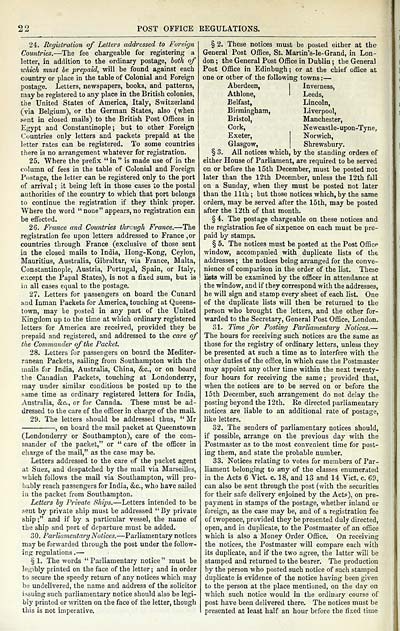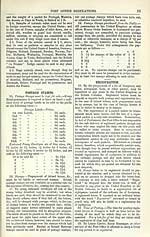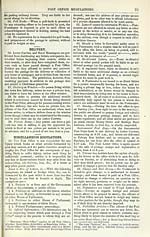Download files
Complete book:
Individual page:
Thumbnail gallery: Grid view | List view

22
POST OFFICE REGULATIONS.
24. Registration of Letters addressed to Foreign
Countries. — The fee chargeable for registering a
letter, in addition to the ordinary postage, both of
which must he prepaid, will be found against each
country or place in the table of Colonial and Foreign
postage. Letters, newspapers, books, and patterns,
may be registered to any place in the British colonies,
the United States of America, Italy, Switzerland
(via Belgium), or the German States, also (when
sent in closed mails) to the British Post Offices in
Egypt and Constantinople; but to other Foreign
Countries only letters and packets prepaid at the
letter rates can be registered. To some countries
there is no arrangement whatever for registration.
25. Where the prefix " in " is made use of in the
column of fees in the table of Colonial and Foreign
Postage, the letter can be registered only to the port
of arrival ; it being left in those cases to the postal
authorities of the country to which that port belongs
to continue the registration if they think proper.
Where the word "none" appears, no registration can
be effected.
26. France and Countries through France. — The
registration fee upon letters addressed to France ,or
countries through France (exclusive of those sent
in the closed mails to India, Hong-Kong, Ceylon,
Mauritius, Australia, Gibraltar, via France, Malta,
Constantinople, Austria, Portugal, Spain, or Italy,
except the Papal States), is not a fixed 3um, but is
in all cases equal to the postage.
27. Letters for passengers on board the Cunard
and Inman Packets for America, touching at Queens-
town, may be posted in any part of the United
Kingdom up to the time at which ordinary registered
letters for America are received, provided they be
prepaid and registered, and addressed to the care of
the Commander of the Packet.
28. Letters for passengers on board the Mediter-
ranean Packets, sailing from Southampton with the
mails for India, Australia, China, &c, or on board
the Canadian Packets, touching at Londonderry,
may under similar conditions be posted up to the
same time as ordinary registered letters for India,
Australia, &c, or for Canada. These must be ad-
dressed to the care of the officer in charge of the mail.
29. The letters should be addressed thus, " Mr
, on board the mail packet at Queenstown
(Londonderry or Southampton), care of the com-
mander of the packet," or " care of the officer in
charge of the mail," as the case may be.
Letters addressed to the care of the packet agent
at Suez, and despatched by the mail via Marseilles,
which follows the mail via Southampton, will pro-
bably reach passengers for India, &c, who have sailed
in the packet from Southampton.
Letters by Private Ships. — Letters intended to be
sent by private ship must be addressed " By private
ship;" and if by a particular vessel, the name of
the ship and port of departure must be added.
30. Parliamentary Notices. — Parliamentary notices
may be forwarded through, the post under the follow-
ing regulations . —
§ 1. The words "Parliamentary notice" must be
legibly printed on the face of the letter; and in order
to secure the speedy return of any notices which may
be undelivered, the name and address of the solicitor
issuing such parliamentary notice should also be legi-
bly printed or written on the face of the letter, though
this is not imperative.
§ 2. These notices must be posted either at the
General Post Office, St. Martin's-le- Grand, in Lon-
don ; the General Post Office in Dublin ; the General
Post Office in Edinbugh; or at the chief office at
one or other of the following towns : —
Aberdeen,
Inverness,
Athlone,
1 Leeds,
Belfast,
Lincoln,
Birmingham,
Liverpool,
Bristol,
Manchester,
Cork,
Newcastle-upon-Tyne
Exeter,
Norwich,
Glasgow,
Shrewsbury.
All notices which, by the standing orders of
either House of Parliament, are required to be served
on or before the 15th December, must be posted not
later than the 12th December, unless the 12th fall
on a Sunday, when they must be posted not later
than the lltii ; but those notices which, by the same
orders, may be served after the 15th, may be posted
after the 12th of that month.
§ 4. The postage chargeable on these notices and
the registration fee of sixpence on each must be pre-
paid by stamps.
§ 5. The notices must be posted at the Post Office
window, accompanied with duplicate lists of the
addresses ; the notices being arranged for the conve-
nience of comparison in the order of the list. These
lists will be examined by the officer in attendance at
the window, and if they correspond with the addresses,
he will sign and stamp every sheet of each list. One
of the duplicate lists will then be returned to the
person who brought the letters, and the other for-
warded to the Secretary, General Post Office, London.
31. Time for Posting Parliamentary Notices. —
The hours for receiving such notices are the same as
those for the registry of ordinary letters, unless they
be presented at such a time as to interfere with the
other duties of the office, in which case the Postmaster
may appoint any other time within the next twenty-
four hours for receiving the same ; provided that,
when the notices are to be served on or before the
15th December, such arrangement do not delay the
posting beyond the 12th. Be -directed parliamentary
notices are liable to an additional rate of postage,
like letters.
32. The senders of parliamentary notices should,
if possible, arrange on the previous day with the
Postmaster as to the most convenient time for post-
ing them, and state the probable number.
33. Notices relating to vote3 for members of Par-
liament belonging to any of the classes enumerated
in the Acts 6 Vict. c. 18, and 13 and 14 Vict. c. 69,
can also be sent through the post (with the securities
for their safe delivery enjoined by the Acts), on pre-
payment in stamps of the postage, whether inland or
foreign, as the case may be, and of a registration fee
of twopence, provided they be presented duly directed,
open, and in duplicate, to the Postmaster of an office
which is also a Money Order Office. On receiving
the notices, the Postmaster will compare each with
its duplicate, and if the two agree, the latter will be
stamped and returned to the bearer. The production
by the person who posted such notice of such stamped
duplicate is evidence of the notice having been given
to the person at the place mentioned, on the day on
which such notice would in the ordinary course of
post have been delivered there. The notices must be
presented at least half an hour before the fixed time
POST OFFICE REGULATIONS.
24. Registration of Letters addressed to Foreign
Countries. — The fee chargeable for registering a
letter, in addition to the ordinary postage, both of
which must he prepaid, will be found against each
country or place in the table of Colonial and Foreign
postage. Letters, newspapers, books, and patterns,
may be registered to any place in the British colonies,
the United States of America, Italy, Switzerland
(via Belgium), or the German States, also (when
sent in closed mails) to the British Post Offices in
Egypt and Constantinople; but to other Foreign
Countries only letters and packets prepaid at the
letter rates can be registered. To some countries
there is no arrangement whatever for registration.
25. Where the prefix " in " is made use of in the
column of fees in the table of Colonial and Foreign
Postage, the letter can be registered only to the port
of arrival ; it being left in those cases to the postal
authorities of the country to which that port belongs
to continue the registration if they think proper.
Where the word "none" appears, no registration can
be effected.
26. France and Countries through France. — The
registration fee upon letters addressed to France ,or
countries through France (exclusive of those sent
in the closed mails to India, Hong-Kong, Ceylon,
Mauritius, Australia, Gibraltar, via France, Malta,
Constantinople, Austria, Portugal, Spain, or Italy,
except the Papal States), is not a fixed 3um, but is
in all cases equal to the postage.
27. Letters for passengers on board the Cunard
and Inman Packets for America, touching at Queens-
town, may be posted in any part of the United
Kingdom up to the time at which ordinary registered
letters for America are received, provided they be
prepaid and registered, and addressed to the care of
the Commander of the Packet.
28. Letters for passengers on board the Mediter-
ranean Packets, sailing from Southampton with the
mails for India, Australia, China, &c, or on board
the Canadian Packets, touching at Londonderry,
may under similar conditions be posted up to the
same time as ordinary registered letters for India,
Australia, &c, or for Canada. These must be ad-
dressed to the care of the officer in charge of the mail.
29. The letters should be addressed thus, " Mr
, on board the mail packet at Queenstown
(Londonderry or Southampton), care of the com-
mander of the packet," or " care of the officer in
charge of the mail," as the case may be.
Letters addressed to the care of the packet agent
at Suez, and despatched by the mail via Marseilles,
which follows the mail via Southampton, will pro-
bably reach passengers for India, &c, who have sailed
in the packet from Southampton.
Letters by Private Ships. — Letters intended to be
sent by private ship must be addressed " By private
ship;" and if by a particular vessel, the name of
the ship and port of departure must be added.
30. Parliamentary Notices. — Parliamentary notices
may be forwarded through, the post under the follow-
ing regulations . —
§ 1. The words "Parliamentary notice" must be
legibly printed on the face of the letter; and in order
to secure the speedy return of any notices which may
be undelivered, the name and address of the solicitor
issuing such parliamentary notice should also be legi-
bly printed or written on the face of the letter, though
this is not imperative.
§ 2. These notices must be posted either at the
General Post Office, St. Martin's-le- Grand, in Lon-
don ; the General Post Office in Dublin ; the General
Post Office in Edinbugh; or at the chief office at
one or other of the following towns : —
Aberdeen,
Inverness,
Athlone,
1 Leeds,
Belfast,
Lincoln,
Birmingham,
Liverpool,
Bristol,
Manchester,
Cork,
Newcastle-upon-Tyne
Exeter,
Norwich,
Glasgow,
Shrewsbury.
All notices which, by the standing orders of
either House of Parliament, are required to be served
on or before the 15th December, must be posted not
later than the 12th December, unless the 12th fall
on a Sunday, when they must be posted not later
than the lltii ; but those notices which, by the same
orders, may be served after the 15th, may be posted
after the 12th of that month.
§ 4. The postage chargeable on these notices and
the registration fee of sixpence on each must be pre-
paid by stamps.
§ 5. The notices must be posted at the Post Office
window, accompanied with duplicate lists of the
addresses ; the notices being arranged for the conve-
nience of comparison in the order of the list. These
lists will be examined by the officer in attendance at
the window, and if they correspond with the addresses,
he will sign and stamp every sheet of each list. One
of the duplicate lists will then be returned to the
person who brought the letters, and the other for-
warded to the Secretary, General Post Office, London.
31. Time for Posting Parliamentary Notices. —
The hours for receiving such notices are the same as
those for the registry of ordinary letters, unless they
be presented at such a time as to interfere with the
other duties of the office, in which case the Postmaster
may appoint any other time within the next twenty-
four hours for receiving the same ; provided that,
when the notices are to be served on or before the
15th December, such arrangement do not delay the
posting beyond the 12th. Be -directed parliamentary
notices are liable to an additional rate of postage,
like letters.
32. The senders of parliamentary notices should,
if possible, arrange on the previous day with the
Postmaster as to the most convenient time for post-
ing them, and state the probable number.
33. Notices relating to vote3 for members of Par-
liament belonging to any of the classes enumerated
in the Acts 6 Vict. c. 18, and 13 and 14 Vict. c. 69,
can also be sent through the post (with the securities
for their safe delivery enjoined by the Acts), on pre-
payment in stamps of the postage, whether inland or
foreign, as the case may be, and of a registration fee
of twopence, provided they be presented duly directed,
open, and in duplicate, to the Postmaster of an office
which is also a Money Order Office. On receiving
the notices, the Postmaster will compare each with
its duplicate, and if the two agree, the latter will be
stamped and returned to the bearer. The production
by the person who posted such notice of such stamped
duplicate is evidence of the notice having been given
to the person at the place mentioned, on the day on
which such notice would in the ordinary course of
post have been delivered there. The notices must be
presented at least half an hour before the fixed time
Set display mode to: Large image | Transcription
Images and transcriptions on this page, including medium image downloads, may be used under the Creative Commons Attribution 4.0 International Licence unless otherwise stated. ![]()
| Scottish Post Office Directories > Towns > Glasgow > Post-Office annual Glasgow directory > 1870-1871 > (794) |
|---|
| Permanent URL | https://digital.nls.uk/84402355 |
|---|
| Description | Directories of individual Scottish towns and their suburbs. |
|---|
| Description | Around 700 Scottish directories published annually by the Post Office or private publishers between 1773 and 1911. Most of Scotland covered, with a focus on Edinburgh, Glasgow, Dundee and Aberdeen. Most volumes include a general directory (A-Z by surname), street directory (A-Z by street) and trade directory (A-Z by trade). |
|---|


